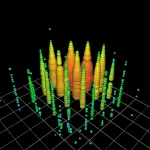(Press-News.org) Boston, MA - People who eat diets with higher amounts of healthy plant-based foods and lower amounts of less-healthy plant-based foods may reduce their risk of stroke compared to people with lower-quality diets, according to a new study led by researchers from Harvard T.H. Chan School of Public Health. They found that healthy plant-based diets--defined as rich in foods such as leafy greens, whole grains, and beans, and including lower levels of foods like refined grains, potatoes, and added sugars--may lower overall stroke risk by up to 10%.
"Our findings have important public health implications, suggesting that future nutrition policies to lower stroke risk should take the quality of food into consideration," said first author Megu Baden, a postdoctoral fellow in the Department of Nutrition.
The study will be published online March 10, 2021, in Neurology, the medical journal of the American Academy of Neurology.
Evidence suggests that plant-based diets may lower the risk of diabetes, cardiovascular disease, and other diseases; however, few studies have looked at whether these diets lower the risk of stroke, and their results have been inconsistent.
In this study, researchers analyzed health data from 209,508 women and men in the Nurses' Health Study, Nurses' Health Study II, and Health Professionals Follow-Up Study, who did not have cardiovascular disease or cancer at the start of their participation. They were followed for more than 25 years and completed diet questionnaires every two to four years.
Participants were scored on diet quality based on the healthfulness of the plant-based foods that they ate. People who ate a serving or less of meat or fish per month were classified as vegetarians.
The researchers found that a healthy plant-based diet--in addition to being linked with 10% lower overall stroke risk--was associated with a modest reduction in risk of ischemic stroke, the most common type of stroke, which occurs when blood flow to the brain is blocked. There was no association found between a healthy plant-based diet and reduced risk of hemorrhagic stroke, which occurs when an artery in the brain leaks blood or ruptures.
In a separate analysis, the researchers did not find any association between a vegetarian diet and lowered risk of stroke, although they noted that the number of study participants classified as vegetarians was small. The researchers suggested that this result--as well as inconsistent results in prior studies looking at plant-based diets and stroke risk--may in part be explained by a high proportion of low-quality plant-based foods in participants' diets.
"Many individuals have been increasing the amount of plant-based components in their diet," said Kathryn Rexrode, associate professor of medicine at Brigham and Women's Hospital and co-author of the paper. "These results show that higher intake of healthy plant-based foods may help reduce long-term stroke risk, and that it is still important to pay attention to diet quality of plant-based diets."
INFORMATION:
Other Harvard Chan School co-authors of the study included Zhilei Shan, Fenglei Wang, Yanping Li, JoAnn Manson, Eric Rimm, Walter Willett, and Frank Hu.
This research was funded by grants UM1 CA186107, U01 CA176726, U01 CA167552, R01 HL034594, R01 HL088521, and R01 HL35464 from the National Institutes of Health. Baden was supported by a fellowship from the Manpei Suzuki Diabetes Foundation. Hu was supported by grants HL60712, HL118264, and DK112940 from the National Institutes of Health.
"Quality of Plant-based Diet and Risk of Total, Ischemic, and Hemorrhagic Stroke," Megu Baden, Zhilei Shan, Fenglei Wang, Yanping Li, JoAnn E. Manson, Eric B. Rimm, Walter C. Willett, Frank B. Hu, Kathryn M. Rexrode, Neurology, online March 10, 2021, doi: 10.1212/WNL.0000000000011713
Visit the Harvard Chan School website for the latest news, press releases, and multimedia offerings.
Harvard T.H. Chan School of Public Health brings together dedicated experts from many disciplines to educate new generations of global health leaders and produce powerful ideas that improve the lives and health of people everywhere. As a community of leading scientists, educators, and students, we work together to take innovative ideas from the laboratory to people's lives--not only making scientific breakthroughs, but also working to change individual behaviors, public policies, and health care practices. Each year, more than 400 faculty members at Harvard Chan School teach 1,000-plus full-time students from around the world and train thousands more through online and executive education courses. Founded in 1913 as the Harvard-MIT School of Health Officers, the School is recognized as America's oldest professional training program in public health.
University of Texas at Dallas chemist Dr. Jie Zheng has spent much of his career investigating gold nanoparticles for their potential impact in the field of nanomedicine. In new research, he and his colleagues show how these nanoparticles could play a key role in a simple blood test to detect acute liver damage earlier than current methods.
The study, published online Feb. 19 in the journal Science Advances, expands on corresponding author Zheng's work, which has previously demonstrated the use of nanoparticles for targeted delivery of cancer drugs and better understanding of kidney disease.
"Our goal is to make it simple for family ...
One of the most classic algorithmic problems deals with calculating the shortest path between two points. A more complicated variant of the problem is when the route traverses a changing network--whether this be a road network or the internet. For 40 years, an algorithm has been sought to provide an optimal solution to this problem. Now, computer scientist Christian Wulff-Nilsen of the University of Copenhagen and two research colleagues have come up with a recipe.
When heading somewhere new, most of us leave it to computer algorithms to help us find the best route, whether by using a car's GPS, or public transport and map apps on their phone. Still, there are times when a proposed route doesn't quite align with reality. This is because road networks, ...
A team of pediatricians at the Medical University of South Carolina (MUSC) was the first in the nation to enroll patients with multisystem inflammatory syndrome in children (MIS-C), a rare but life-threatening complication of COVID-19, in a trial of remestemcel-L. This investigational cell therapy, developed and manufactured by Mesoblast, New York, New York, had previously been shown safe and effective for other inflammatory conditions. The MUSC team reports in Pediatrics that the two children enrolled thus far showed significant improvement within 24 hours of remestemcel-L administration.
"While it appears to many people that COVID is no big deal ...
During the COVID-19 pandemic, people who recognize the connections they share with others are more likely to wear a mask, follow health guidelines and help people, even at a potential cost to themselves, a new University of Washington study shows.
Indeed, an identification with all humanity, as opposed to identification with a geographic area like a country or town, predicts whether someone will engage in "prosocial" behaviors particular to the pandemic, such as donating their own masks to a hospital or coming to the aid of a sick person.
The study, published March 10 in PLOS ONE, is drawn from about 2,500 responses, from more than 80 countries, to an online, international ...
Images
As far back as the Greek historian Herodotus, a group of people called the Scythians were considered highly mobile warrior nomads.
Scythian-era people lived across Eurasia from about 700 BCE to 200 BCE, and have long been considered highly mobile warriors who ranged widely across the steppe grasslands. Herodotus describes Scythian populations as living in wagons and engaging in raiding and warfare, and this view has persisted throughout history--supported by archeologists' observations of similar styles of horse harnesses, weapons, burial mounds and animal style motifs throughout ...
A study conducted by researchers at the University of São Paulo in Brazil shows that competition for nutrients and lack of cooperation among bacteria of the species Escherichia coli in the same population and in situations of food scarcity prevent mutants that are better adapted to the environment from flourishing, except those that organize in small groups. The phenomenon masks the emergence of novel bacterial variants, making the mutation rate seem lower than it is in fact.
Mutants constantly emerge and accumulate from one generation to the next. Mutation frequency determines the evolution of a given species. Understanding ...
The legalization of cannabis and the arrival of nonmedical fentanyl are fundamentally changing drug markets in North America. A large part of these changes relates to the ability to produce large quantities of the drugs at low costs, which has slashed wholesale prices for both drugs and retail prices for cannabis. A new analysis explores the effects of these changes on use. The analysis concludes that sharp declines in production costs for cannabis and opioids could dramatically reduce the price per dose for consumers in ways that alter patterns of use and dependence.
The analysis, by a researcher at Carnegie Mellon University (CMU), is published in the International Journal of Drug Policy.
"Historical analogies suggest that very large ...
On December 6, 2016, a high-energy particle called an electron antineutrino was hurtling through space at nearly the speed of light. Normally, the ghostly particle would zip right through the Earth as if it weren't even there.
But this particle just so happened to smash into an electron deep inside the South Pole's glacial ice. The collision created a new particle, known as the W- boson. That boson quickly decayed, creating a shower of secondary particles.
The whole thing played out in front of the watchful detectors of a massive telescope buried in the Antarctic ice, the IceCube Neutrino Observatory. This enabled IceCube ...
MAYWOOD, IL - A recent Loyola Medicine study found that reducing the standard dose of IV-administered ketamine in half is as effective as the larger, standard dose in reducing pain in adults.
Ketamine is known to provide pain relief comparable to opioid medications, which are highly addictive. In the recent study, appearing in the journal Academic Emergency Medicine, researchers studied 98 patients, ages 18 to 59, who presented to the emergency department with acute, moderate to severe pain. The patients were randomized prospectively to receive either 0.15 mg/kg of ketamine (low dose) or 0.30 mg/kg (high dose). Patients ...
Drug developed by Northwestern scientists
Fatal brain cancer has no current cure
Drug is revolutionary new class of drugs applicable to other neurological diseases
CHICAGO --- An early clinical trial in individuals with the deadly brain cancer, glioblastoma, showed an experimental spherical nucleic acid (SNA) drug developed by Northwestern University scientists was able to penetrate the blood-brain barrier and trigger the death of tumor cells.
This is the first time a nanotherapeutic has been shown to cross the blood-brain barrier when given through intravenous infusion and alter the genetic machinery of a tumor to cause cell death. The drug crossed the blood-brain barrier, ...





